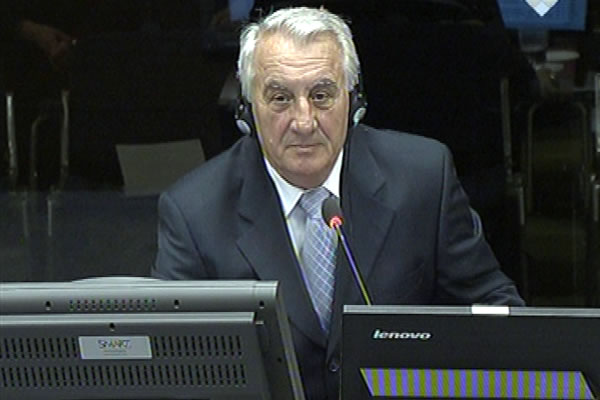Home
FROM DEFENSE TO SELF-DEFENSE
General Dragisa Masal called to The Hague to testify as Ratko Mladic’s defense witness, but as his testimony progressed, he had to defend himself against the prosecutor's accusations that he was responsible for the shelling of civilian areas in Gorazde, burning down houses, unlawful detention of civilians and an abduction in Strpci
 Dragisa Masal, defence witness at Rako Mladic trial
Dragisa Masal, defence witness at Rako Mladic trial During the war in BH,Bosnian Serb military general Dragisa Masal held top military positions. He is now retired. In February 1993, the witness was appointed commander of the Visegrad Tactical Group and its five brigades. In August 1994, Masal was appointed chief of artillery in the VRS Main Staff and remained at that post until the end of the war. Ratko Mladic’s defense, which called Masal to The Hague to testify, stressed that the witness used his high rank in the Bosnian Serb military to defend Serbsand Muslims alike. The prosecutor on the other hand alleged that Masal was involved in the war crimes.
In his statement, Masal stated that his units didn’t prevent the passage of humanitarian convoys to the enclaves of Srebrenica, Zepa and Gorazde. They let the convoys through even though the convoys were used to smuggle arms and military supplies for the Muslim fighters, Masal noted. According to the witness, the Bosnian Serb army observed the ceasefire agreements and did what it could to protect the non-Serbs.
The prosecutor asked the judges to caution the witness in line with Tribunal's Rule 90e, which allows the witness not to respond to any questions which might incriminate him if he were to be indicted. As the cross-examination continued, it became clear what Masal could be charged with.
First, the prosecutor showed an order Masal issued in Frebruary 1993, instructing his troops to shell continuously for days the Gorazde enclave with ‘two to three projectiles at irregular intervals'. The fire should stop on 12 February 1993 and then continue the next day, concentrating 'heavy fire' on ‘the market place’. The prosecutor put it to the witness that the idea was to make the people believe that the attacks had stopped. Thus, many people would come to the market place on Saturday and would be easy prey for Masal’s artillery. The witness tried hard to justify his actions. First, Masal said that he didn’t remember the order. He went on to note that during the war the market places were closed down and that the troops would gather in the town market in Gorazde.
Asked if the market was indeed shelled on Saturday, Masal replied that he did not receive any report to that effect. ‘Do you mean to say that you played at war and that you didn’t receive reports on how your orders were being implemented’, judge Moloto asked the witness. Masal said that he did receive reports but was not able to remember this specific order now.The report on the shelling of the market may have been missing, but the prosecutor did show a series of documents which indicate that the Bosnian Serb army often targeted civilian areas in Gorazde.
As the cross-examination continued, the prosecutor highlighted the witness’s role in the kidnapping of 18 Bosniak men and a Croat in Strpci on 27 February 1993. The victims disappeared without a trace after they were taken off a train traveling from Belgrade to Bar through Bosnia and Herzegovina. At the time, the site where the abduction took place was under the control of the 2nd Podrinje Brigade and its commander was Luka Dragicevic. The unit operated as part of Masal’s Tactical Group. The witness's order to subordinated units issued 21 February 1993 on Radovan Karadzic’s instructions was admitted into evidence today. In the order, Masal wants information about ‘the captured Muslims from the Sandzak area’. ‘If you don’t have them yet’, Masal says in the order, ‘detain them immediately’. The witness admitted that he had issued the order, but he was adamant that he didn’t mean civilians but ‘Muslims that went from Sandzak to Gorazde and Sarajevo’.
The prosecutor also showed a large number of documents proving that Muslim civilian facilities, including schools and mosques, were attacked in the area of responsibility of Masal’s Tactical Group. Some villages were burned down, according to the prosecutor’s documents. The witness brushed it off enemy propaganda and lies spread by international observers. The witness was also confronted with Bosnian Serb military documents which show that among the people held in detention in the witness’s area of responsibility there weremen older than 70 and girls younger than 10. The witness argued that they had been arrested before his appointment as the commander of the Visegrad Tactical Group. In an order for the attack on the Gorazde area on 11 April 1994, Masal quoted Mladic’s words, ‘Push on vigorously, Turks must disappear from this territory’.
While Masal was the artillery chief in the Main Staff, modified air bombs, weapons notorious for their inaccuracy and high destructive power, were used by the VRS. A Main Staff report dated 15 June 1995 was admitted into evidence today. The document states that two air bombs, a napalm bomb and several mortar shells were fired ‘in retaliation’ on Muslim villages. The witness replied that he didn’t do it. At the time of the attack he was in Drvar, the witness explained. When the judges asked Masal if the attack had really taken place, he said he didn’t know. ‘Obviously, this is a report’, the witness said by way of explanation.
On Monday, the defense will re-examine Masal.
Linked Reports
- Case : Mladic
- 2015-03-18 UPLEASANT STENCH OF DEAD BODIES
- 2015-03-17 ‘TOP PROFESSIONAL’ UNINFORMED
- 2015-03-16 WERE BOSNIAN SERBS FORCED TO SPLIT FROM BH INTERIOR MINISTRY OR WAS IT ALL PART OF A PLAN
- 2015-03-20 PROSECUTION OPPOSES FOUR-MONTH BREAK AT MLADIC TRIAL
- 2015-03-23 WHO ARE TURKS FROM GORAZDE?
- 2015-03-24 VIDOJE BLAGOJEVIC’S ‘DEFENSE ZONE’
